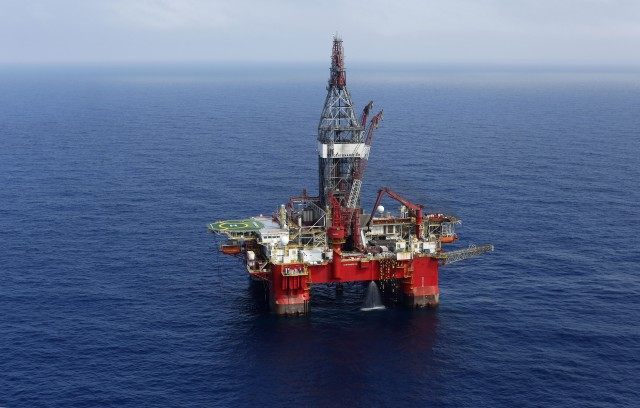The historic offshore oil block auction conducted this week by Mexico fell flat as only two of the fourteen offshore oil fields were awarded. Some of the largest oil companies in the world stayed completely away from the auction.
The auction was the first time since Mexico seized all energy assets 77 years ago that international energy companies were allowed to bid for these resources, according to an AFP article. The event was the result of national energy reforms proposed by Mexican President Enrique Peña Nieto. It was Peña Nieto’s second major embarrassment of the week, following on the heels of the maximum-security prison escape of drug lord Joaquin “El Chapo” Guzman Loera. It was El Chapo’s second prison escape in fourteen years.
Nearly one year ago, the Mexican president announced his country would be reforming its oil and natural gas industry to attract international investment. Breitbart Texas reported from a meeting in Texas the day before Mexico’s historic announcement. During that meeting between Mexican officials and potential U.S. investors held in Central Texas, Pemex Vice President Luis Manuel Nemer Alvarez stressed the importance of this energy reform program to his country’s future.
“It is impossible for Pemex to continue to explore and develop our resources without additional investment,” Nemer said to the group. He told the audience that $60 billion is needed to properly develop the potential of these resources.
“This is not just AN opportunity for Mexico,” he said to this reporter, “it is THE opportunity.” He said this is a must-succeed time for his country.
After nearly one year of the Mexican energy reform program’s rollout, only eighteen individual companies completed the process to become qualified to bid in the auction. At the end of the auction, only nine companies had participated, according to the AFP article.
“This was a bad week for Mexico,” said Peter O. Estévez, principal, Energy Gas & Oil Mexico International S.A.C.V. in an interview with Breitbart Texas. “The bottom dropping out of oil prices in the market affected the excitement and momentum initially shared my many E&P companies over Mexico’s energy reforms.”
“The timing of the release of the first package is unfortunate,” Estévez told this writer. “However, I trust this will allow the National Hydrocarbons Commission’s (CNH) and the Ministry of Energy’s (SENER) reconsideration of conditions, pricing and requirements. Mexico is a new market and many companies are going to be cautious and apprehensive until the process is tested by the first one’s in.”
Speculation on the impact of Iran’s possible re-entry into the international oil market also potentially had a negative impact on the auction. “It was the worst week because oil prices are very low and because of the (nuclear) deal” between Iran and world powers on the eve of the auction, Mexico-based energy analyst David Shields told AFP.
AFP reported the Iranian deal could add an additional 1.5 million barrels per day of crude oil into the international market.
Exxon, Chevron, and Total SA skipped the bidding process on the first 14 shallow-water oil blocks, according to a Bloomberg report on the Houston Chronicle’s FuelFix blog. Block number 2 received a winning bid from a consortium of Sierra Oil and Gas, Talos Energy, and Premier Oil Plc. The first block did not even receive a qualifying bid, Bloomberg reported.
Breitbart Texas’ Peter Maffitt reported in May that this energy reform program was critical to the economic growth of Mexico. He reported a study by Dr. Ken Medlock that demonstrated Mexico’s PEMEX was one of the least efficient nationally-owned oil companies. A major reason for this inefficiency is the Mexican federal government’s habit of draining PEMEX of its assets.
Medlock’s study said that PEMEX has never retained sufficient capital to replace its quality reserves.
A video of the entire presentation, held at the Mexico Center of the Baker Institute at Rice University is available online. click on the entry for Mexico Center at the bottom of the page, pull down the Multimedia menu, choose Videos, and look for the Featured Video near the bottom of the page, “Mexico’s Energy Reform – Powering the Future.”
Another problem potentially dissuading international investors away from Mexico is the ongoing drug cartel war raging just south of the Texas border. In April, Breitbart Texas’ Ildefonso Ortiz reported on the impact the activities of drug cartels with energy companies seeking to invest in the newly available Mexican oil and gas markets. He said these companies would likely have to deal with theft and other crimes from these cartels that have been waging war with each other for the past couple of months.
Those crimes could run from theft of product and equipment, to having to pay ransom demands from kidnappers, to paying protection money to be able to operate. As an example, Ortiz reported on a lawsuit filed by plaintiffs from a manufacturing plant located in Reynosa, Mexico. The plant, Thermo Fisher, would routinely be accosted by cartel gunmen who would enter the plant waiving machine guns and terrorizing employees.
The AFP article, referenced above, states that the Mexican president hopes his energy reform program would reverse the years of declining production. That production has fallen from a rate of 3.5 million barrels per day in 2004 to 2.3 million barrels per day presently.
“This is the first chapter of a story that will have many more events. We can’t judge it based on the first chapter,” Juan Francisco Torres Landa told AFP in the article. He serves as an energy expert for the Mexico-based global law firm, Hogan Lovells.
Bob Price is a senior political news contributor for Breitbart Texas and a member of the original Breitbart Texas team. Follow him on Twitter @BobPriceBBTX.

COMMENTS
Please let us know if you're having issues with commenting.